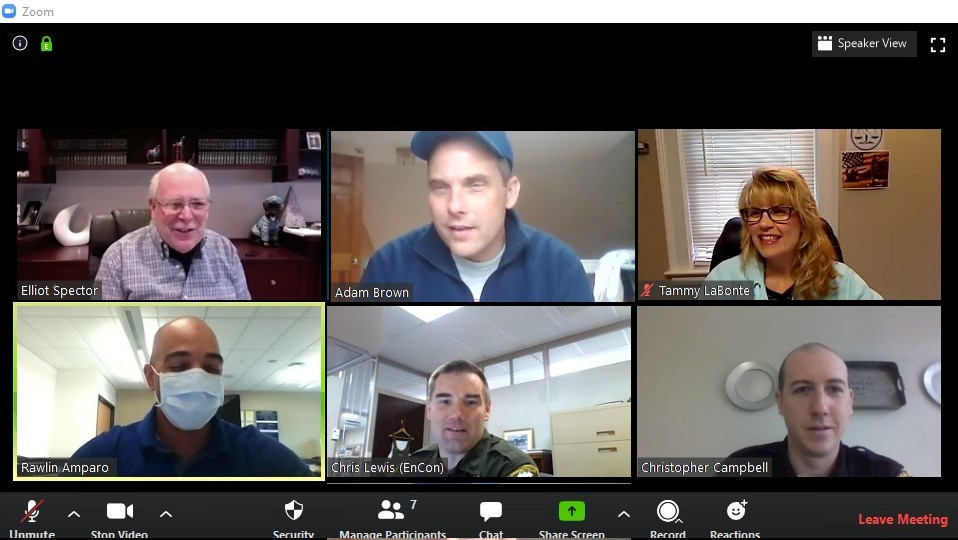
I recently sent two of my officers through the Spector Criminal Justice Training Network’s Comparative Certification Program. On short notice, Tammy LaBonte personally worked with us to provide a customized training program to fit the officer’s training needs. Both officers praised the instructors and stated it was the best training they had ever received.
Chief Michael D. Custer, Rocky Hill Police Department
I can’t say enough about Tammy LaBonte and her knowledge, professionalism, organization and responsiveness. She was always available to answer any questions and ensured that the coursework was both relevant and necessary. She went above and beyond to ensure thank every requirement was covered and tailored to each Officer’s needs. The Spector Criminal Justice Network is an invaluable asset to the criminal justice community in Connecticut.
Jaime Del Mauro
I recently completed the Comparative Certification program. I took a lot away from the courses and was very impressed with all the instructors. Thank you for making the transition into CT that much easier.
Jacob DeRosa, DEEP
Comparative Certification Training
Please visit the CT POSTC website for information on applying for Comparative Certification.
There are links below we have provided for your convenience.
From: https://portal.ct.gov/POST/Frequently-Asked-Questions/Frequently-Asked-Questions
Q. If I have received “Basic Training in another state or while employed as a police officer, do I have to be trained again?
A. Not necessarily. You may be eligible for a status of Comparative Compliance if; the employing law enforcement unit recommends the Council consider an alternative route or waiver to satisfy the basic training requirements; you have completed at least two years of full-time employment with a law enforcement unit: have not had more than three years separation from a law enforcement unit.
In determining whether to waive all or a portion of the required police basic training program,the Police Officer Standards and Training Council shall evaluate in comparison to current requirements the quality and extent of the candidate’s (1) previous basic training and certification as a police officer; (2) formal, professional and in-service training and education in law enforcement or criminal justice, and (3) length of service and field experience as a police officer. The council may waiver those portions of the police basic training program for which a candidate demonstrates (a) the satisfactory completion of a substantial equivalent training or educational program in another state of jurisdiction, or (b) a length of service with field experience sufficient to establish a practical mastery of the required skills, or a satisfactory combination of both.
To apply, please visit https://portal.ct.gov/POST/Certification-Division/Comparative-Certification; Michael Francis, Field Program Consultant, is in charge of Comparative Certification and Lateral Certification. He can be reached at Tel: 203-427-2621, Email: Michael.Francis1@ct.gov.
Visit https://portal.ct.gov/POST/Certification-Division/Comparative-Certification to review the current meeting schedule of the POST Certification Subcommittee which is tasked with reviewing all requests for POST Council approval. The subcommittee meets seven (7) times per year to review all comparative requests.
2023: All completed forms and supportive documentation must be sent to Certification Division with a deadline of the third (3rd) Thursday of the following months: February, April, June, July, August, October, and December.
You can view the scheduled dates here: https://portal.ct.gov/POST/_old-MISC/Meetings/Subcommittee-Agendas
TRAINING QUESTIONS:
What Training is Included in the Comparative Certification Training Program?*
What are the Benefits of This Program?
- Your officer(s) will receive training quickly allowing your agency to get them out on the road faster. This will save you money in the long run, because you’ll be paying your officers to patrol rather than paying them to be trained.
- Instructors know they are teaching to students with policing backgrounds and adjust their material accordingly.
- As with all our programs, our instructors are experts in their respective fields and are POSTC certified.
- SCJTN handles the coordinating of the training and the credit form completion.
- As a courtesy, SCJTN coordinates the DMV Per Se class (w/Dept. of Motor Vehicles), the Hunting Laws class (with DEP) and schedules the required Search & Seizure test with POSTC to keep the students together and move through the program seamlessly.
What is Required to Have my Probationary Officer Participate?
When are the Training Programs Scheduled?
How Much Does It Cost?
Where Does the Training Take Place?
What Else Do I Need to do to Prepare?
- Send us a copy of the letter that POSTC provides to you as soon as you have it in your possession.
- Tell your probationary officer that because the program is accelerated, the schedule will be varied and include evening training and weekends. They should provide you with any conflicts in their personal schedules from the start date of the program and four weeks following.
- You should alert us to any training conflicts your probationary officer has that we should avoid in the schedule.
- Please Order the Required Texts: Looseleaf Title 14 Book and Police Field Manual (The Red Book) at https://www.blue360media.com/. Please also obtain an infraction schedule book (JD-CR-3).
Please call Tammy LaBonte at 860-593-6550 with any questions or concerns.
